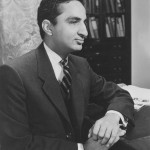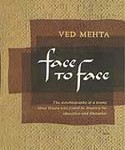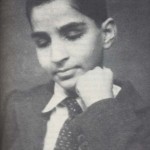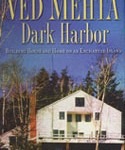Inside the New Yorker
“Sweetheart, you don’t want to play with that. Here, let me take you to mommy.” The speaker is Ved Mehta, and the “sweetheart” is his one-year-old daughter, Sage, who is advancing towards the flashing red light of PW’s tape recorder with single-minded intensity. Ignoring a playpen piled high with toys in the adjacent dining room, she navigates her way across the living room, tiny fingers poised to seize the desired object by its dangling strap.
Gently, Mehta lifts his daughter and carries her down the hallway. When he reappears, he observes, in a characteristically dry fashion, that yes, it is odd how small children can distinguish mechanical objects. He adds, “That’s why psychologists call them love objects, because it goes right back to infancy, the things we choose to fixate on. I’m sure children perceive their parents as objects at the beginning as well.” Seated in the center of a blue couch, sipping from a coffee cup perched securely on his lap, Mehta has a quality of seeming both attentive and distant at the same time. On this particular morning, thin slats of sunlight come through the tall windows facing busy 79th Street, casting one side of Mehta’s face in light, the other in shadow.
The 51-year-old Indian author has recently completed the fifth volume in his autobiographical series. Entitled Sound Shadows of the New World (Norton), the book covers Mehta’s adolescence, from his arrival in the U.S. from India at age 15 to his graduation from the Arkansas School for the Blind three years later. Without exactly skirting the issue in his previous books, neither has Mehta fully confronted his blindness as he does in Sound Shadows. (The phrase “sound shadows” refers to the echoes and sensations in the air that a blind person perceives.) Mehta’s sojourn in Arkansas was replete with complex, difficult situations, illuminating discoveries, and large and small triumphs, all of which he recounts with admirable candor.
Mehta next attended Pomona College in California, then read history at Oxford University on a Hazen Fellowship before proceeding to Harvard for graduate studies, also in history. After he joined the staff of The New Yorker in 1961, Mehta became best known for his articles for that magazine, many of which have subsequently appeared as books. They range from political and social commentary (Fly and Fly-bottle: Encounters with British Intellectuals) to biography (Mahatma Gandhi and His Apostles) to fiction (Delinquent Chacha) and include his autobiographical series: the histories of his parents—Daddyji and Mamaji, a childhood memoir,Vedi, and the sequel, The Ledge Between the Streams, dealing with the partition of India, a traumatic event for the Mehta family.
Though the bulk of his writings deals with India, Mehta asserts that he is not motivated by a desire to explain or interpret the Indian culture to the West. “I think I can leave that to sociologists, anthropologists and political scientists. These books in the autobiographical series are really to be read more like a novel than a tract of any kind,” he says, adding, “I have done certain political books, in which I’ve tried to do that, reportage—although I don’t like the word—essays and so on.”
“I don’t think I write for any audience,” he continues. “I write for myself. I think the writer is always the ideal reader. Anytime an artist gets involved in what the audience is going to think, that’s the death of art.” Mehta’s voice is cool and unruffled; his manner, eminently dignified and cultivated. He does not remember a specific moment in his life when he realized that writing was his calling. “I don’t think you ever know,” he remarks. “I mean, I still don’t know that I’m a writer. In a way, writing is a lifetime apprenticeship. However good you are, when you face the terror of a blank page, you find you don’t know anything. It’s very mercurial, the whole enterprise—not like law or medicine where you say, ‘Ah! Now I have my degree, and that’s done.’ Talent comes, and talent goes.”
Though he is known for his disciplined working habits, putting in eight hours most days at his office at The New Yorker, Mehta insists that his approach to writing is idiosyncratic. “I never know where I am with a book,” he admits. “I work forwards and backwards. Sometimes I strike out like a racehorse and sometimes I go as slowly as a crab. I don’t even know what’s the beginning or the end of the book until it’s near the finishing line.” For his autobiographies, “the method is unique. I can be bold and say that,” he asserts with a shy smile. “I do research in the sense that I dig up land records, deeds, tax books, account records, diaries or whatever, and then I interview many of the people in my past at length.” Only after accumulating “hundreds and hundreds of pages of notes” does Mehta sit down for a session of what he calls “free association.”
“I think back to where I was when I was 15,” he explains. “What did I do during the day? Where did I sleep? How did I eat? Who were my friends? Why did they become my friends? And so on—I imagine it’s rather like what people say analysis is.”
This process of analyzing the past is, for the most part, unconscious, but it enables him to “eliminate the unimportant experiences and preserve the others. So only those experiences get written about which still have some bearing upon my life.” The ability to find meaning in experience is something Mehta finds lacking in society today. “We’re living in a culture where people have very little use for memory, very little use for history,” he observes. “I happen to think that civilized life is impossible without memory. If you don’t know why the Western countries fought World War II, then you don’t know what civilization is about.”
Recovering the past has both a rewarding and a dark side, as Mehta has also discovered. “Certainly in reliving the past as I’ve been doing, there’s a lot of psychic pain involved,” he notes. “But I feel that in order to live life fully you have to confront these issues; you can’t sweep them under the carpet. Even though you think they’re resolved, they continue to have psychic force. So even though the autobiography series deals with experiences that are many years old, they have personal relevance and that’s why they come to the surface, and that’s why I write about them. Just as I think each generation rewrites history, each generation picks out that which speaks to it now. So the books in my autobiography deal with my life now, even though each volume is set in a different period of my life.” The rewarding aspect of looking into his past is having the perspective of an older person, he adds. “It’s rather like being an archeologist of oneself, digging into oneself to see how one has become what one is now, what kinds of decisions were made, and watching your development . . . that’s really the wonderful, thrilling aspect of it.”
In 1982, Mehta received a John D. and Catherine T. MacArthur Foundation “genius” award—a total of $236,000 to support his writing projects. The grant has made it possible for him to work on the next volume of his autobiography without financial pressures. News of this no-strings-attached award was “a happy experience,” Mehta recalls in a mild understatement. “I haven’t had any job except writing,” he explains. “I’ve only earned my living by writing, and when I got the call from the president of the MacArthur Foundation, I thought it was a prank—one of my friends having me on. So I tried to stay very cool, but when I was asked, ‘What is your social security number?’ I knew it was the real thing.
“You know, Virginia Woolf said that there is no independent thinking without financial independence. I’ve always had to write to pay the rent, and in some years, such as the five when I was working on Gandhi, my income was just a few thousand dollars.” But now, “just the illusion of having independence for five years changes your whole way of thinking.”
Evidence of this change in a more tangible form is Mehta’s marriage in 1983 to Linn Cary Mehta, an assistant program officer at the Ford Foundation. Sage, upon whom Mehta clearly dotes, is their first child. The MacArthur award has enabled Mehta to continue work on the next volume of his autobiography, dealing with his college years at Pomona. “I really want to get on with the story now,” he declares. “I began the series in 1972, and here we are in 1985, and I’ve put aside the narrative so many times to do other books. But now it’s so far along that I feel it’s pushing me from behind, that I have to get on with the series.”
What of the sudden interest in India with the Festival of India art shows, the Raj Quartet TV series and a spate of films appearing about India over the last two years? Mehta is unimpressed. “It’s a funny thing,” he observes, a note of disdain in his voice. “I’ve been writing about India since 1956, and it’s been a forbidden subject as far as publishers are concerned…to produce a book about India is almost like giving a stillbirth. They’re just not interested.” He draws a distinction between substantive and faddish interest in the country. “There’s been frivolous interest in yoga, in Indian clothes and food for many years, and now it’s boiled over into art exhibitions and this entire festival we’re seeing.” Mehta compares the sudden curiosity about India to the excitement displayed when Kissinger went to China in 1973. “You couldn’t go to New York parties without hostesses serving Chinese food and having Chinese decorations,” he recalls. “Today it’s India, tomorrow it might be a country in Africa, who knows? These are public relations events, which is not, to say that these things aren’t good, but they hardly touch the tip of the iceberg.”
Mehta faults the media for focusing on the cultural and historical aspects of India while ignoring its poverty and manifold social problems. “Here is a country which has more people—600 million—than any other nation in the history of the world, but you won’t hear much about that. Most of the Festival of India is art from the richer and older part of India. Nobody is interested in the fact that perhaps 70% of the Indian people suffer from malnutrition or that malnutrition inevitably leads to brain damage. It’s all on another level, but if you want to help India, those are the questions you have to think about.”
Mehta’s autobiographical series is sometimes described as the Indian equivalent of Paul Scott’sThe Raj Quartet. Mehta claims to be flattered by the comparison, but, he notes, Scott was really writing about the English in India. “I think one reason people were so interested in the television adaptation was because so much of it was about Edwardian England; it was really all about the English, and even the main Indian character went to an English public school.” Mehta’s books, on the other hand, in addition to not being about the English, are “written from the perspective of the inside looking out, not from the outside going in,” he comments. “They’re just very different in flavor. Also, I’m writing about actual living people, although I’ve used the techniques of fictional writers.”
Is Mehta as widely read an author in his native India as he is in the U.S. and England, we ask. “Practically all my books are available in Indian editions,” he points out. “But whether I’m as well known there as I am here or in England I can’t say. Certainly the books would be read by more Indians if books weren’t so expensive there; for a book to really make an impact in India it has to be quite cheap.” His reputation in the U.S. is helped, he adds, by the fact that many of his books appear first as articles in The New Yorker . “More people read my pieces in The New Yorker than will probably ever buy my books in this country. So it’s possible that my work is more familiar to Americans than to Indians.”
Mehta’s association with The New Yorker has been a major influence on his writing. When he speaks of the magazine, it is with a mixture of reverence and awe. “The New Yorker has done more for writers than any other institution in the world,” he maintains. At its heart, says Mehta, the publication “is a free association of writers,” one which, “unless you’ve been a part of this association, it’s hard to imagine. But see yourself going to an office at a place where you can see some of the leading writers of the Western world—some of the most creative people around—and to be a part of that group is a wonderful thing. We’re aware of each other’s writings, preoccupations and obsessions, and we feed off each other.” About those qualities defining the “New Yorker culture,” Mehta has definite views. “The magazine stands for certain civilized values, for certain wonderful things in prose—courtesy, clarity and harmony,” he pronounces. “These are the old values—of what art, good art—is supposed to be.” True art, Mehta believes, “is timeless. And however particular the art might be, it has to be universal. Look at Conrad, Tolstoy, Dostoevsky … they wrote about particular experiences, but here, nearly 80 years later, we can read and understand what they were say-ing.” In his own work, Mehta notes, “I’m not just slavishly following a chronological framework or trying to interpret. India or blindness or any of that. All I’m trying to do is to tell a story of not one life, but many lives—and through those stories, to try to say something that’s universal.”




